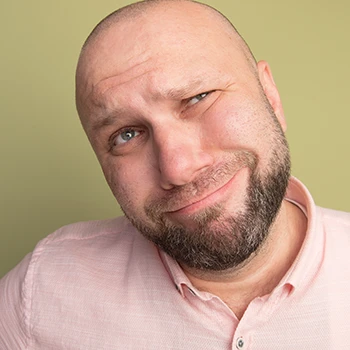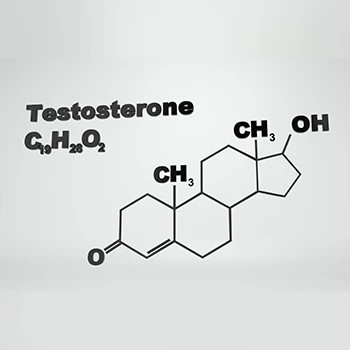Testosterone plays a key role in health and fitness, but even men in their 30s can end up with very low testosterone for several reasons.
Some just put it all down to natural aging, but I decided to have a chat with an endocrinologist who specializes in men’s health issues and hormones.
Together, we spent an entire day going through scientific papers that zeroed in on testosterone deficiency for men in their 30s.
Here’s why you need to monitor low testosterone in your fourth decade.
Quick Summary
- Low testosterone in men in their 30s can be caused by factors like weight gain, smoking, alcohol consumption, and lack of exercise, impacting fertility, sex drive, and physical health.
- Diet, exercise, testosterone replacement therapy, and supplements are effective ways to boost testosterone levels.
- Approximately 25% of men over 30 experience a natural decline in testosterone production by about 1% each year.
- In my opinion, a balanced approach combining lifestyle changes and medical advice is crucial for managing low testosterone effectively.
What Causes Low Testosterone in Men Over 30?

Key factors contributing to low testosterone in men over 30 include weight gain, insufficient exercise, alcohol, smoking, and health conditions like diabetes and cancer [1].
Additionally, testosterone production naturally declines by 1% annually after 30, affecting about a quarter of this age group, according to the ABC News [2].
This hormonal change is largely regulated by brain signals.
Based on study published in PubMed, there are two hormones that the brain and pituitary gland release to stimulate testosterone production: luteinizing hormone (LH) and follicle-stimulating hormone (FSH) [3].
As mentioned above, diet, fitness, and physical activity play a significant role in releasing these hormones.
I’ll get to some low testosterone treatment options shortly, but first, let’s look at what can happen with testosterone deficiency.
Related Article: What Causes Low Testosterone?
What Happens When A Man's Testosterone Is Low?

While there are many processes in the body that depend on steady hormone levels, there are some symptoms of low testosterone you should be aware of.
Reduced Fertility
Many things can influence sperm production, but it is heavily reliant on testosterone [4]. It’s one of the most common reasons that people opt for testosterone therapy.
But it’s also important to look at general health factors, including diet and body mass, before considering medical testosterone therapy.
Reduced Sex Drive
In extreme cases, testosterone deficiency syndrome can cause erectile dysfunction. Through my interactions with clients, I've learned that even even a slightly lower T-count can have a substantial impact on libido [5].
There are other health reasons and hormones that come into play, but improving dietary habits can make a big difference in sexual function.
“In a large study of men in Massachusetts, about 11% overall said they had a lack of sex drive. The researchers then tested all the men's testosterone levels. About 28% of men with low testosterone had low libido.”
- Matthew Hoffman, MD at WebMD.com
Physical and Psychological Changes
From my personal training experience, I've seen clients struggle with muscle mass and bone density loss due to low testosterone levels.
According to the World J Mens Health, there’s also a higher risk of sleep apnea [6]. Bone density is a big risk as many people don’t show symptoms until they reach serious levels of bone loss.
Exploring the psychological dimensions, it's crucial to acknowledge how low testosterone in men in their 30s can significantly impact mental health, potentially exacerbating conditions like depression and anxiety, thereby emphasizing the need for a holistic treatment approach that addresses both physical and mental well-being.
Related Article: Do Bald Guys Have More Testosterone?
How Can You Boost Testosterone: From Dietary Adjustments to Hormone Replacement Therapy ?

Here’s what to do If your testosterone level is low. For a comprehensive understanding of testosterone replacement solutions, consider reading the Fountain TRT Review.
Diet
As a coach, I always advise clients with low T-counts to first focus on a diet rich in testosterone-boosting foods.
Even if you qualify for hormone replacement therapy, you could be undoing a lot of that medical intervention by continuing with a diet that reduces natural testosterone production [7].
Start with a generally healthy and balanced diet. And then add things like ginger, leafy greens, oysters, and fatty fish [8].
A testosterone-boosting diet plan will also help avoid many serious health conditions allowing you to lose weight more effectively.
Exercise
In my training sessions, I've noticed how regular exercise can significantly boost testosterone levels in men. That makes having a regular workout regime all the more important, according to the study published in WebMD [9].
Testosterone-building exercises will also help to build up more muscle mass, which provides more motivation to keep getting fit.
Ultimately, it creates a positive feedback loop where more exercise reduces fat reserves, which boosts testosterone and muscle fibers [10].
Testosterone Replacement Therapy

Men with very low T-count often have to go for testosterone replacement therapy [11].
Testosterone replacement therapy, often linked to pituitary gland issues, should be discussed with a doctor due to its significant side effects.
Close monitoring is essential to prevent long-term complications.
Supplements
One of the best treatment options for low testosterone is to try out some natural testosterone boosters.
Supplements containing a blend of vitamins, minerals, herbs, and amino acids can effectively enhance your body's natural hormone production when formulated with scientifically backed ingredients.
FAQs
Is Low Testosterone Normal at 30?
Yes, low testosterone can be normal from age 30 due to natural aging.
But ensuring that your levels don’t drop too far is a key part of slowing down normal aging and avoiding health issues as well.
How Do You Test for Low Testosterone?
The best way to test and diagnose low testosterone is with a blood test. What these blood tests do is measure your free testosterone, and by comparing the results over time, it gives you an indication of where your levels are heading.
References:
- https://accelresearchsites.com
- https://abcnews.go.com/Health/Healthday/story?id=4508669&page=1
- https://pubmed.ncbi.nlm.nih.gov/33683047/
- https://health.clevelandclinic.org/low-testosterone-and-fertility/
- https://www.webmd.com/men/how-low-testosterone-can-affect-your-sex-drive
- https://www.ncbi.nlm.nih.gov/pmc/articles/PMC6305865
- https://www.ncbi.nlm.nih.gov/pmc/articles/PMC6266690/
- https://www.medicalnewstoday.com/articles/323759#top-8-testosterone-boosting-foods
- https://www.webmd.com/men/features/exercise-and-testosterone
- https://www.menstclinic.com/blog/what-does-testosterone-have-to-do-with-weight-loss
- https://www.mayoclinic.org/healthy-lifestyle/sexual-health/in-depth/testosterone-therapy/art-20045728
About The Author
You May Also Like






